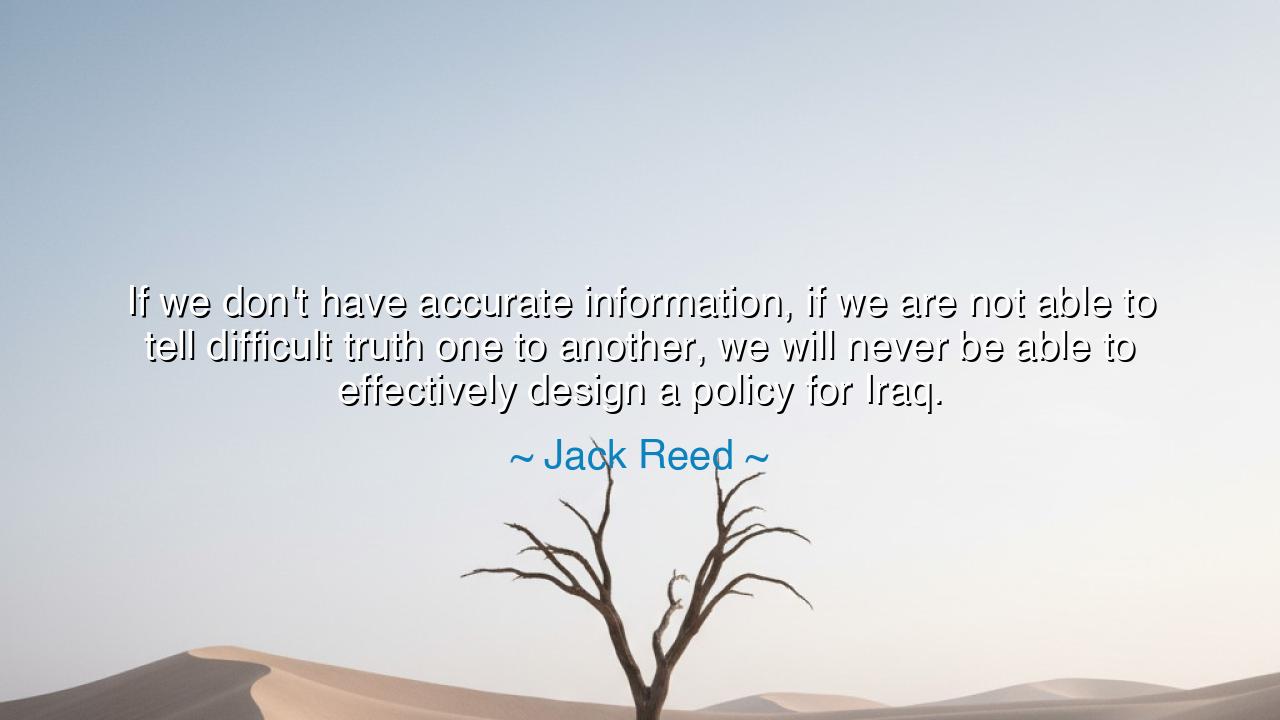
If we don't have accurate information, if we are not able to tell
If we don't have accurate information, if we are not able to tell difficult truth one to another, we will never be able to effectively design a policy for Iraq.






The statesman Jack Reed once spoke words of enduring truth: “If we don’t have accurate information, if we are not able to tell difficult truth one to another, we will never be able to effectively design a policy for Iraq.” These words, born from the furnace of war and the weight of governance, strike at the heart of a timeless principle: that truth is the foundation of wisdom, and without it, even the mightiest nations build their destinies on sand. In Reed’s lament, we hear not merely a critique of politics, but an echo of the ancient struggle between honesty and illusion, between the courage to face reality and the comfort of denial.
In speaking of Iraq, Reed invoked one of the most turbulent chapters in modern history—a conflict not only of armies but of ideas, built upon shadows of misinformation and the fog of pride. The lessons of that war are many, but none so vital as this: when leaders craft policies upon falsehoods, they unleash chaos not only upon the world but upon their own souls. For truth, though difficult and often unwelcome, is the only compass that can guide humanity through the storms of error and ambition. Reed’s words remind us that the failure to speak truth to one another is the seed of every failed empire, every unjust war, every broken peace.
The ancients knew this well. When Pericles governed Athens, he declared that the strength of democracy lay not in flattery, but in the courage to debate the hard truths. He warned his people that nations perish not from weakness, but from the refusal to see themselves clearly. Yet his successors ignored that wisdom. They chose comfort over candor, and so Athens fell—its glories dimmed, its people enslaved, its ideals lost in the dust. History, as Reed reminds us, is filled with such echoes: Rome blinded by its pride, France by its hunger for conquest, and America, too, tested by its illusions of certainty.
Truth is not gentle—it is a sword that cuts before it heals. But without that wound, no healing can begin. The “difficult truths” Reed speaks of are not mere facts or figures; they are moral reckonings. To admit failure, to confront mistakes, to confess what has gone wrong—these are acts of courage far greater than victory in battle. The soldier who faces the enemy shows bravery of the body; the leader who faces the truth shows bravery of the spirit. And yet, how rare such bravery has become in an age where image outweighs integrity, and convenience replaces conscience.
Reed’s warning, though born from a particular war, extends to every realm of life. Whether in governance, in families, or within our own hearts, we fail when we fear the truth. The individual who deceives himself cannot grow; the nation that deceives its people cannot stand. The design of a just policy, like the building of a temple, requires straight stones and honest hands. Lies, however skillfully carved, will always crumble beneath the weight of time. Thus, those who would lead—whether in politics or in spirit—must learn the art of truthful discourse, even when the truth burns.
There is a story told of Abraham Lincoln, who once said that he would rather be right than be president. He knew that truth is not always popular, but it is always victorious in the end. When the nation was divided, he spoke not to please the people, but to awaken their conscience. It was this faith in truth, not strategy alone, that saved the Union. The lesson is clear: policies founded upon truth endure; those born of deception devour their creators.
Therefore, let this be the teaching: truth is not an obstacle to action—it is its beginning. To seek truth is to build wisely; to avoid it is to court ruin. Let us learn to speak difficult truths, first to ourselves and then to one another. In our homes, in our workplaces, in our nations, let truth be the architect of our decisions. For only when honesty flows freely can peace take root. And in the end, as Reed reminds us, a policy—whether for Iraq, for a nation, or for a life—built upon truth is not merely effective; it is righteous.






AAdministratorAdministrator
Welcome, honored guests. Please leave a comment, we will respond soon